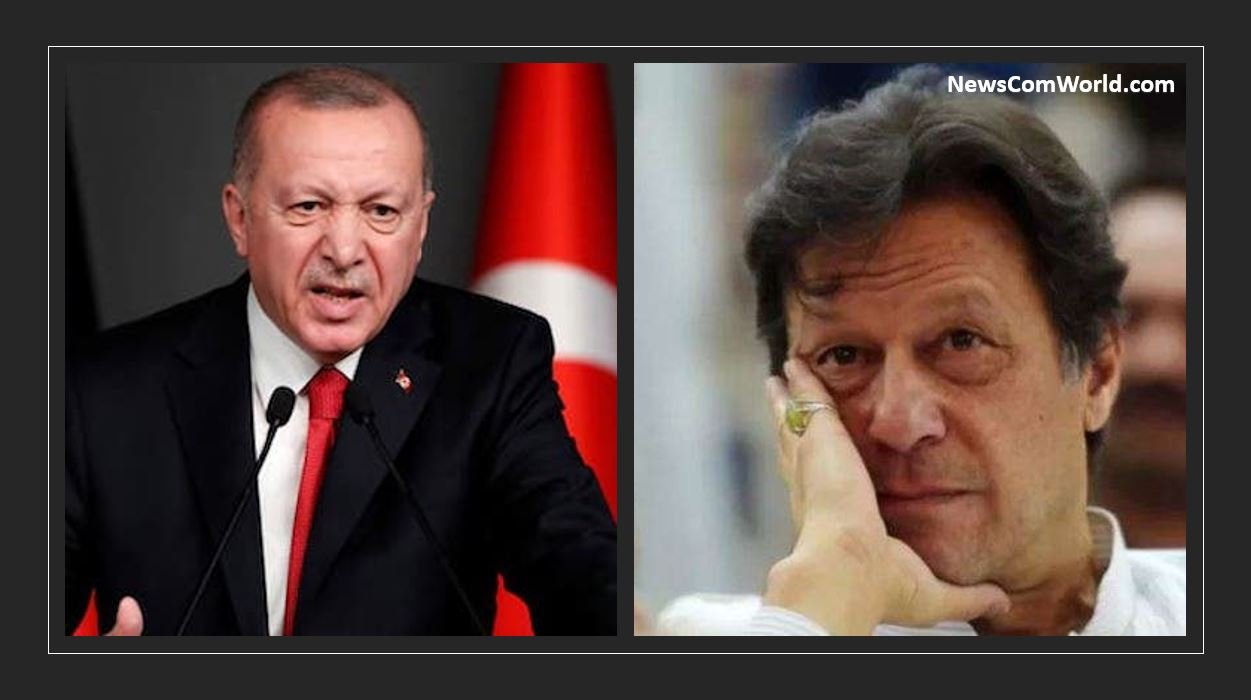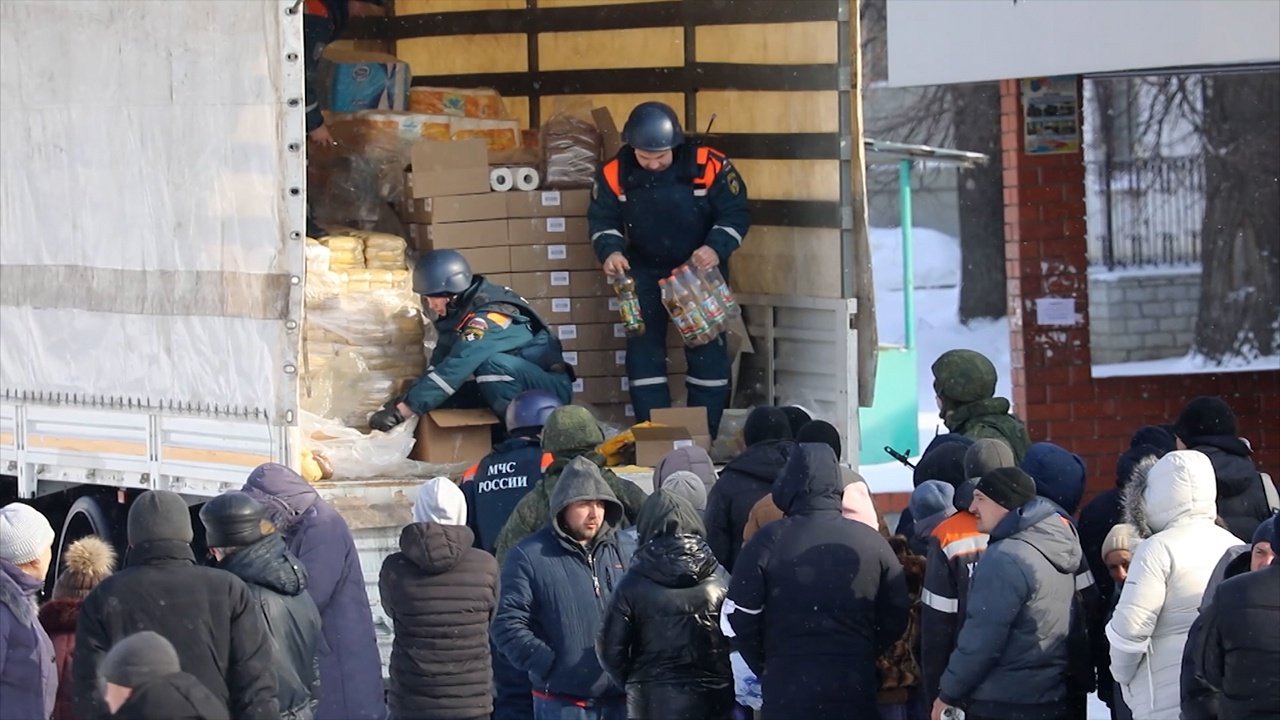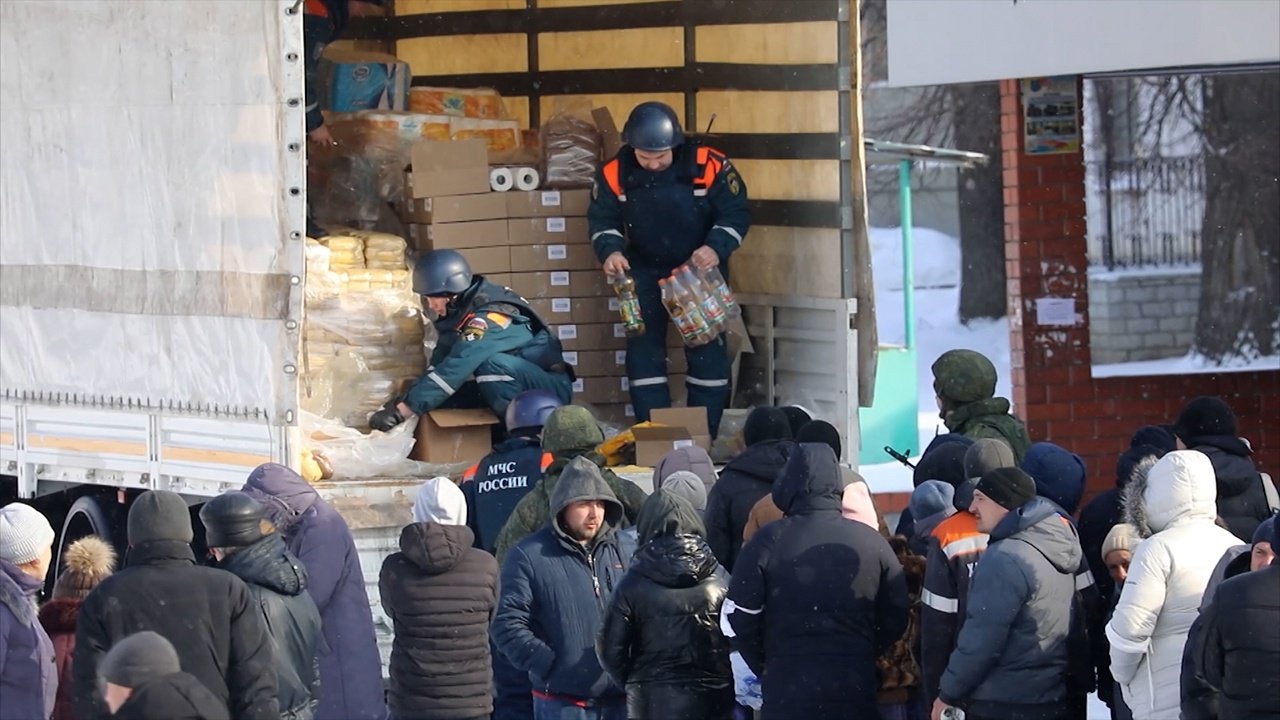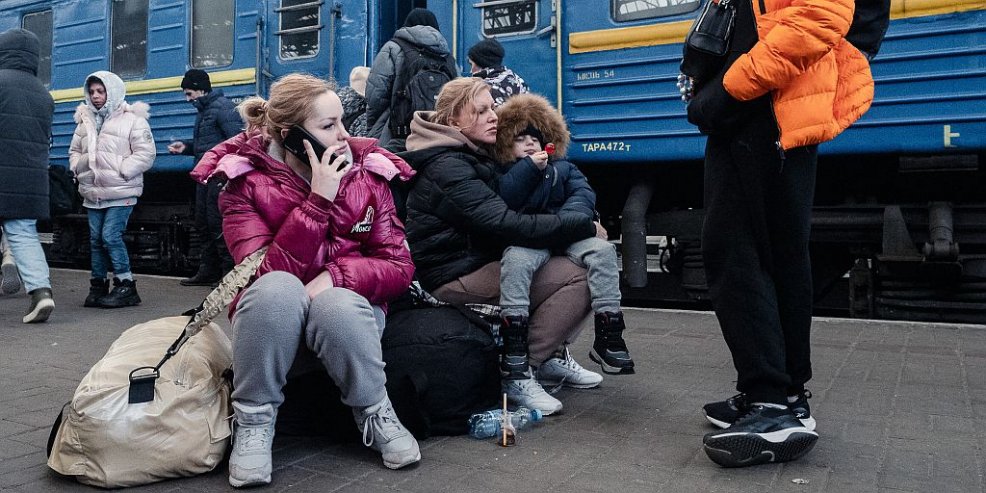US President Trump imposed sanctions on Turkey over Syria Invasion. He signed the executive order imposing the sanctions on Monday night (14-October 2019). EU Nations also met in Luxembourg on Monday and banned all Arms Exports to Turkey. They also considered placing sanctions on Turkish Oil drilling companies. After Monday’s Stock Market crash in Turkey, the fresh sanctions are expected to further crash the Turkish stock market and put pressure on its currency LIRA.
He said: “The situation in and in relation to Syria, and in particular the recent actions by the Government of Turkey to conduct a military offensive into northeast Syria, undermines the campaign to defeat the Islamic State of Iraq and Syria, or ISIS, endangers civilians, and further threatens to undermine the peace, security, and stability in the region, and thereby constitutes an unusual and extraordinary threat to the national security and foreign policy of the United States.”
The US President Trump imposed sanctions and said that the executive order punishes Turkey for excessive use of force.
“This Order will enable the United States to impose powerful additional sanctions on those who may be involved in serious human rights abuses, obstructing a ceasefire, preventing displaced persons from returning home, forcibly repatriating refugees, or threatening the peace, security, or stability in Syria,” the White House said in a statement.
Turkish officials will face “a broad range of consequences,” the White House said, “including financial sanctions, the blocking of property, and barring entry into the United States.”Mr Trump said that the US will “aggressively use economic sanctions to target those who enable, facilitate, and finance these heinous acts in Syria.”
He added: “I am fully prepared to swiftly destroy Turkey’s economy if Turkish leaders continue down this dangerous and destructive path.”
Earlier, in a statement announcing the forthcoming sanctions, Mr Trump said: “I have been perfectly clear with President Erdogan: Turkey’s action is precipitating a humanitarian crisis and setting conditions for possible war crimes.
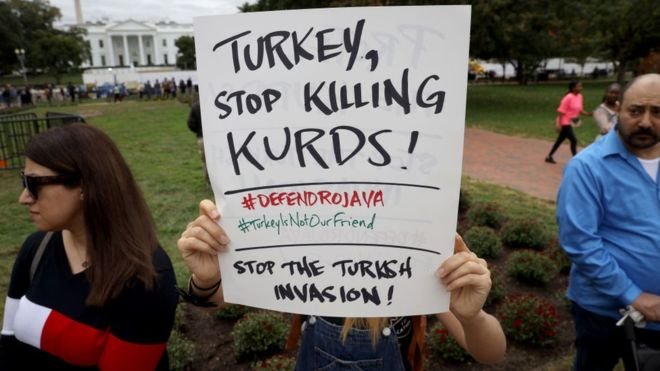
“Unfortunately, Turkey does not appear to be mitigating the humanitarian effects of its invasion.”
US President Donald Trump on Monday authorised sanctions against Turkish officials, said the US would stop negotiating with Turkey on a $100bn trade deal, and boosted tariffs on the country’s steel to 50 percent over Ankara’s military operation in northeast Syria.
Turkey launched the cross-border assault on Kurdish fighters on Wednesday after Trump withdrew some US troops from the region, drawing sharp criticism from fellow Republicans who accused him abandoning allies who fought against Islamic State of Iraq and the Levant (ISIL or ISIS).
Trump on Monday signed an executive order that authorised the US Treasury and State Departments to impose sanctions on individuals, entities or associates of the Turkish government involved in “actions that endangers civilians or lead to the further deterioration of peace, security and stability in northeast Syria”, US Secretary of State Mike Pompeo said in a statement.
According to the US Treasury, Turkish Minister of Defence Hulusi Akar, Interior Minister Suleyman Soylu, and Energy Minister Fatih Donmez were placed on the department’s sanctions blacklist, freezing their US assets and banning US or US-related transactions with them.
In a statement announcing his executive order, Trump said he was “fully prepared to swiftly destroy Turkey’s economy if Turkish leaders continue down this dangerous and destructive path”.
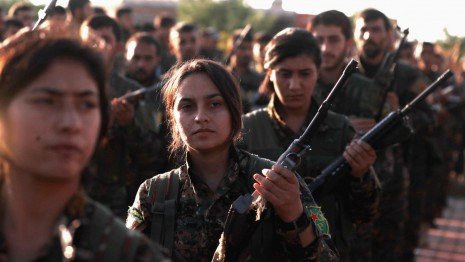
Trump said Turkey’s military offensive “is endangering civilians and threatening peace, security and stability in the region”.
“I have been perfectly clear with [Turkish President Recep Tayyip] Erdogan: Turkey’s action is precipitating a humanitarian crisis and setting conditions for possible war crimes,” he added. “Turkey must ensure the safety of civilians, including religous and ethnic minorities, and is now, or may be in the future, responsible for the ongoing detention of ISIS terrorists in the region.”
Following Trump’s announcement, US Vice President Mike Pence said he was being dispatched to the Middle East to try to mediate the crisis.
He said Trump had told Erdogan on a phone call on Monday to agree to an immediate ceasefire.
“The United States of America simply is not going to tolerate Turkey’s invasion in Syria any further. We are calling on Turkey to stand down, end the violence and come to the negotiating table,” Pence told reporters.
In his tweet Secretary Pompeo tweeted, “The U.S. is now implementing sanctions authorities related to #Turkey’s ongoing military offensive in northeast #Syria, which is endangering civilians and severely undermining the D-ISIS campaign.”
He further tweeted, “This destabilizing operation by Turkey continues, and has now created a growing and disastrous humanitarian crisis. We remain committed to a political solution to the conflict in Syria in line with UNSCR 2254. Turkey’s unilateral actions led to these sanctions.”
It is expected that European Union and US Allies will all place economic sanctions on Turkey to stop its slaughter of Kurds.
European Nations Ban Weapons Export to Turkey
Germany and France have banned arms exports to Turkey over its assault against Kurdish YPG militia in Syria.
Turkey launched the military operation on Wednesday after U.S. President Donald Trump withdrew some U.S. troops who had been backing Kurdish forces in the fight against Islamic State.
“Against the backdrop of the Turkish military offensive… , the Federal Government will not issue any new permits for all military equipment that could be used by Turkey in Syria”, Foreign Minister Heiko Maas said, according to the spokeswoman.
France also said Saturday it has suspended all weapon sales to Turkey and warned Ankara that its offensive in northern Syria threatened European security.
“In expectation of the end of this offensive, France has decided to suspend all plans to export to Turkey weapons that could be used in this offensive. This decision is with immediate effect,” a joint statement from the foreign and defence ministries said.
Turkey’s foreign minister Mevlüt Cavusoglu said that his country was undeterred by bans or embargoes.
Germany exported arms worth 243 million euros ($268 million) to Turkey in 2018, accounting for almost one third of its weapons exports, according to Bild Am Sonntag.
In the first four months of 2019, Turkey received weapons from Germany worth 184 million euros, making it the biggest recipient country, the paper said.
Defense Minister Annegret Kramp-Karrenbauer said on Friday that Germany expected all NATO partners – which include Turkey – to contribute towards stabilizing the region.
European Union Nations commit to arms export ban against Turkey on Monday at a meeting in Luxembourg.
European Union nations vented outrage Monday at Turkey’s military offensive in northern Syria against the Kurds and joined France and Germany in banning arms sales to Ankara, a rare move against a NATO ally for many of them.
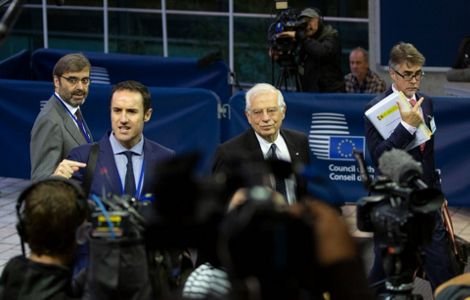
Many EU foreign ministers were looking beyond a strong statement condemning the military operation that has destabilized the whole region and wanted to make sure their move would carry some sting.
They also prepared sanctions against Turkish companies and individuals involved in gas drilling in east Mediterranean waters where EU-member Cyprus has exclusive economic rights and has licensed European energy companies to carry out a hydrocarbons search. The sanctions, which Cypriot officials said may include an asset freeze, travel bans and a sales ban on material used in drilling, could be implemented at short notice. France and Cyprus are conducting naval maneuvers there now.
Over the years, Turkey has become increasingly less dependent on European nations for its defense needs and it was unclear what the impact of such a measure would be beyond applying diplomatic pain.
“There is a strong commitment by all members of the council to take the actions required to stop selling arms to Turkey,” Josep Borrell, the Spanish foreign minister who is slated to become EU foreign policy chief next month, told The Associated Press.
Turkey Threatens to send 3.6 Million Islamic Radicals into EU under the garb of refugees
Relations between the bloc and Turkey under Turkish President Recep Tayyip Erdogan have steadily worsened over the years, especially after he likened some German moves to Nazi practices.
And even though both sides agreed upon a deal in 2016 to stop migrants from traveling westward from Turkey to the European mainland, Erdogan is now wielding that like a cudgel. Since his operation in northern Syria began last week, he has sought to quell Europe criticism of it by warning that he could “open the gates and send 3.6 million refugees your way.”
Dutch Foreign Minister Stef Blok said Monday that “we should not cave in to blackmail.”
Middle East Boycott of Turkey
Saudi Arabia has already stopped Turkish exports from entering kingdom since Saudi journalist Jamal Khashoggi’s murder last year.
Saudi state-run media and leading business figures in the kingdom have been advocating a tourism and import boycotts against the country since the beginning of the summer.
Ajlan al-Ajlan, chairman of the Riyadh Chamber of Commerce and Industry, called for an import boycott on Twitter in June 2019: “As the Turkish leadership and Erdogan continue their hostility and target the kingdom’s leadership, we call more than ever before to boycott them… in all areas – imports, labour and dealings with Turkish companies.”
Earlier in July 2019, the Saudi embassy in Ankara issued a warning to travelers that passport theft and petty crime was increasing in Turkey. Visitors from Saudi Arabia to Turkey dropped 30 percent in the five months of 2019.
Turkey’s continuous support to ISIS and its continuous rhetoric against Israel and its aspirations to be the head of Islam and Islamic Nations has has made Turkey isloated in Middle East. With the exception of Qatar, Turkey has no friends or allies in the region. Turkish ties with the Gulf monarchies, especially Saudi Arabia and the UAE, have suffered because of Erdoğan’s support for the Muslim Brotherhood, which they view as a domestic security threat.
The Turkish-Qatari alliance, meanwhile, has solidified, as both support the Muslim Brotherhood in Egypt, Hamas in Gaza and Brotherhood-linked groups in Syria and Libya. Ankara has provided a lifeline to Doha since its Gulf neighbours placed a blockade in June 2017.
A bloc led by Saudi Arabia is now engaged in a regional battle for influence with the Turkey-Qatar axis. This competition now extends to East Africa, where the Turkey-Qatar axis is vying for influence against the Saudi led bloc along the Nile Valley and around the Horn of Africa in a new Great Game. Turkey is making efforts to build influence in Somalia and Sudan but as the International community is aware, it will be a failed attempt by Turkey.
We covered it in details in our previous article titled “Failed Attempt By Turkey To Become Leader Of Muslim Ummah“
NATO Dilemma
Despite such abrasive relations, Turkey’s links with most EU nations are cemented through the NATO alliance and its commitment to stand by each other’s side in times of need. NATO’s Article 5 says an attack on one member of NATO is an attack on all.
Erdogan on Monday criticized his European allies, saying “We are a NATO ally. Please note that these countries are all NATO countries.”
He added “Whose side should they be on, according to Article 5?”
Still, many think Turkey crossed more than just a physical border when it went into northern Syria last week to attack Syrian Kurdish strongholds — it also endangered the fight against Islamic State militants.
French Foreign Minister Jean-Yves Le Drian said the Turkish military operation had already displaced 130,000 people.
“The Turkish offensive has the risk of bringing (Islamic State) to the fore again in different ways,” Le Drian said. “It is especially grave since it will engender a real humanitarian disaster.”
Le Drian urged the United States to call for a meeting of the international coalition against the Islamic State group, given that the chaos caused by the Turkish offensive was reviving the threat of IS in Syria.
Syria’s Kurds, who Turkey is now going after, were key allies in a U.S.-led coalition against the Islamic State group.
It is expected that after the Economic sanctions placed by US President Donald Trump on Turkey on Monday night, other European Union Nations and Gulf partners will also follow the suit and will put such economic sanctions on Turkey that will have some real impact on Turkey’s decision to slaughter Kurds.
Turkish Stock Market Crash and its Currency Lira slides
The Turkish lira slid 0.8% on Monday in the face of U.S. and European threats of sanctions and embargoes, though skeptical traders said it would weaken much further if Western allies turned words into action over Turkey’s incursion in Syria.
Underlining doubts over the threats, Turkish President Tayyip Erdogan was quoted as dismissing them as “quips” on Sunday, while the country’s ambassador to the U.N. in Geneva called a possible European Union arms embargo “a joke.”
In turn on Sunday, U.S. President Donald Trump said on Twitter that “big sanctions on Turkey are coming.”
The lira TRYTOM=D3 slipped to 5.9315 against the U.S. dollar, its weakest since May 30.
Turkish stocks and bonds also tumbled, with the main share index at its lowest level since June. The cost of insuring government bonds against default hit a six-week high.
The currency, which suffered a crisis last year that knocked Turkey’s economy into recession, has fallen more than 12% so far this year and 5% this month alone as Ankara and Syrian allies attacked Kurdish-led forces in northeastern Syria.
The Turkish offensive and Genocide of Kurds in Syria, now in its sixth day, has drawn international condemnation, including threats from Trump to “obliterate” Turkey’s economy with “powerful” sanctions.
In wake of the current US economic sanctions and the indications that other NATO allies and other US allies will put similar economic sanctions against Turkey, it is expected that Turkey Stock Market and its currency LIRA will see the worst slide seen in the years. Stock Markets experts are expecting a melt down of all Turkish stocks. In case EU Nations go ahead with their plans to put sanctions on Turkish Oil Drilling companies, we can expect a real economic meltdown of Turkish stocks and the currency.
Follow us at:-
Twitter Handle: @newscomworld
Instagram Handle: @newscomworld
Parler Handle: @NewsComWorld
Gab Handle : @NewsComWorld
Tooter Handle: @NewsComWorld
Subscribe our : YouTube Channel https://www.youtube.com/channel/UCnKJQ3gFsRVWpvdjnntQoAA
Like our Facebook Page https://www.facebook.com/NewsComWorld
1,151 total views


